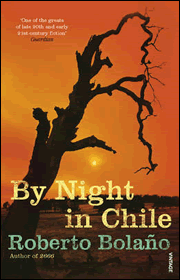By Night in Chile - Roberto Bolaño
The titular night is the night during which the priest Father Sebastian Urrutia narrates his feverish memoirs; it is also the darkness that passed over Chile under Pinochet; it also refers to the nightime activities of the Chilean literati and other dark times.
Right from the start Fr Urrutia introduces one of the novels main themes. Urrita immediately follows his declaration of Chilean nationality by letting us know that "My ancestors on my fathers side came from the Basque country, or Euskadi, as it is now called. On my mother's side I hail from the gentle land of France." Throughout the book, he will refer to people of native Chilean descent as 'ugly', while he himself is "noble" looking, a hint that he may not be much of a Chilean.
All we will really get are hints. Urrutia tells us himself that his "silences are immaculate." This is not a confession but an attempt to "vindicate" himself. Urrutia is not just a priest, he is also a literary critic and poet. In fact there is very little sense of ministry about Urrutia, he is desperate to become part of Chilean literary circles and he cultivates the companionship of the critic Farewell, a predatory sensualist who uses his position as gatekeeper to the literary golden circle to prey on young men, including Fr Urrutia, a 'fledgling' beside a "large bird of prey". Both treat books as badges of their own worthiness and there is no sense that the wider circle to which they belong makes any attempt to engage with what happens in the real Chile during the time the story takes place.
During his first visit to Farewell's estate for a weekend Fr Urrutia wanders off from the house and ends up in the house of some peasants. He is so revulsed by their living conditions and, it seems, by their very existence that he cannot even take in what they are telling him about their child, who may be dying. Then he has a kind of vision, one which will follow him through his life like a bad conscience. "And then I thought I saw the wizened youth standing in the doorway. But it was just nerves. This was at the end of the fifties and he would only have been five years old, or six maybe, a stranger still to the terror, abuse and persecution." We recognise the "wizened youth" from the beginning of the book. It is he who has spread slanderous rumours about the priest and undermined his peace. It is tempting to see him as a brief self portrait of Bolano, the ghost at the party, refusing to keep quiet and surf the status quo.
 |
| "the abstract idea of a lightning bolt" |
Anecdotes take us to Paris during the war, and a Chilean writer/diplomat meeting right wing / fascist? German writer Ernst Jünger. (Could be a biog from Nazi Literature in the Americas) After a discussion of this the critic Farewell tells Urrutia a story of a famous shoemaker in the Austro Hungarian empire who had a dream to build a monument to the heroes of the empire. (The sequence when he arranges to meet the Emperor reminded me of a sequence from The Radetzky March.) This journey into the rotten heart of European history reminded me of 2666 and indeed the whole book has a somewhat similar structure, and meaning.
The final sequence in the book takes place during Pinochet's reign, and the literati are worried. Where can they meet for drinks now that there is a curfew? One of their solutions is to meet in the house of aspiring writer Maria Canales and stay until the next morning, drinking through the curfew. "She was a writer, she was pretty, she was young." She was also married to an American whose work was mysterious. Like in all the best horror movies there was a basement. Bolaño takes us there, by a roundabout route, but the journey is as important as the destination.


URRUTIA not "Urrita"!!!!!
ReplyDeleteThank You Anonymous editor. At least I was consistently wrong!
ReplyDelete